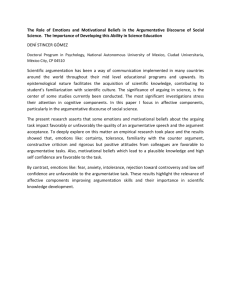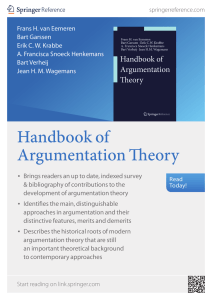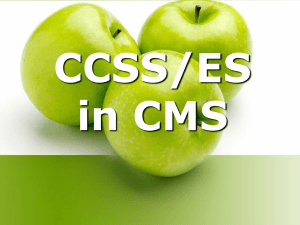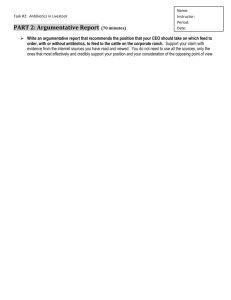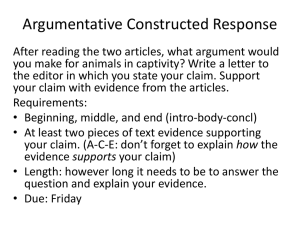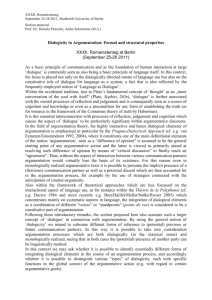Factors of Develoment of Higher Levels of Reading Literacy
advertisement
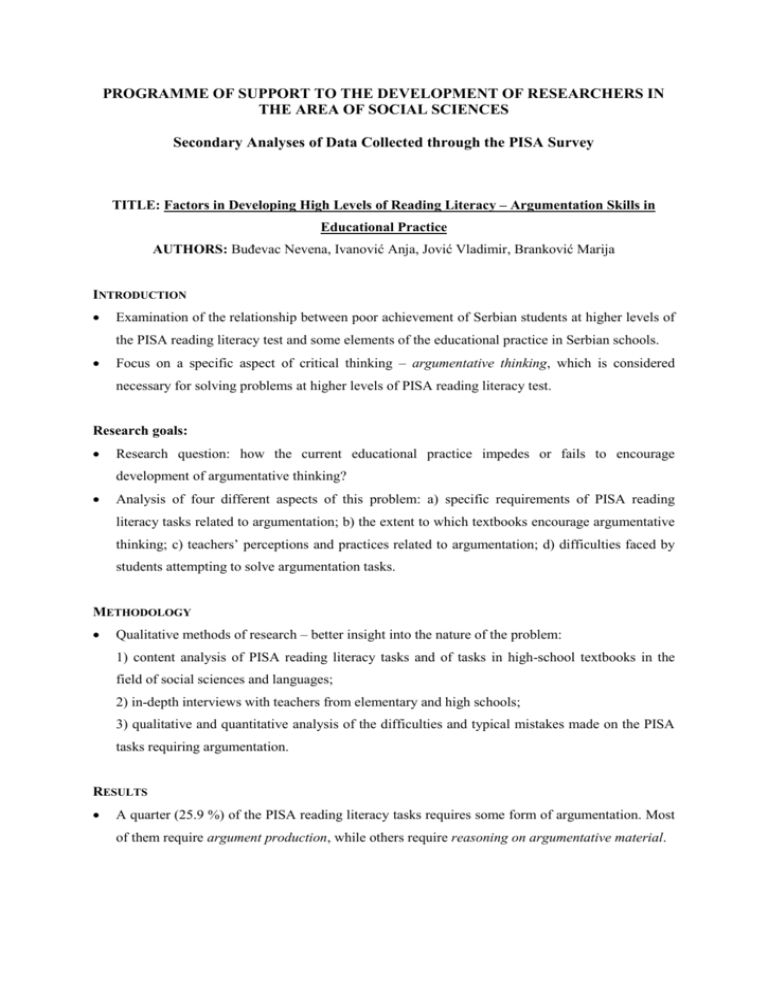
PROGRAMME OF SUPPORT TO THE DEVELOPMENT OF RESEARCHERS IN THE AREA OF SOCIAL SCIENCES Secondary Analyses of Data Collected through the PISA Survey TITLE: Factors in Developing High Levels of Reading Literacy – Argumentation Skills in Educational Practice AUTHORS: Buđevac Nevena, Ivanović Anja, Jović Vladimir, Branković Marija INTRODUCTION Examination of the relationship between poor achievement of Serbian students at higher levels of the PISA reading literacy test and some elements of the educational practice in Serbian schools. Focus on a specific aspect of critical thinking – argumentative thinking, which is considered necessary for solving problems at higher levels of PISA reading literacy test. Research goals: Research question: how the current educational practice impedes or fails to encourage development of argumentative thinking? Analysis of four different aspects of this problem: a) specific requirements of PISA reading literacy tasks related to argumentation; b) the extent to which textbooks encourage argumentative thinking; c) teachers’ perceptions and practices related to argumentation; d) difficulties faced by students attempting to solve argumentation tasks. METHODOLOGY Qualitative methods of research – better insight into the nature of the problem: 1) content analysis of PISA reading literacy tasks and of tasks in high-school textbooks in the field of social sciences and languages; 2) in-depth interviews with teachers from elementary and high schools; 3) qualitative and quantitative analysis of the difficulties and typical mistakes made on the PISA tasks requiring argumentation. RESULTS A quarter (25.9 %) of the PISA reading literacy tasks requires some form of argumentation. Most of them require argument production, while others require reasoning on argumentative material. In stark contrast, a very small percentage (5%) of tasks in the textbooks analyzed (history and Serbian language textbooks) require argumentation. Some textbooks (music and art history) do not contain any tasks at all. A majority of the argumentative tasks in textbook require finding arguments for an already given position. Development of argumentative thinking is not perceived as an important educational goal among teachers. This form of thinking is practiced very rarely and unsystematically in Serbian schools. Teachers share the opinion that knowledge is a prerequisite for thinking and argumentation. Our students answer correctly the questions requiring: a) supporting an opinion presented within short informative text; b) seeking and understanding arguments presented in a text; c) understanding the persuasive power of some text elements (nearly 90% correct answers). They answer incorrectly the questions requiring: a) comparison of information presented in a table with the one presented in a short text/graph, in order to find the contradicting information; b) expression of their own opinion about information presented on a complex graph; c) using the information from the text and apply it to similar situations (61.4% incorrect answers). DISCUSSION A considerable gap between the importance of argumentative skills for PISA achievement and very poor encouragement for their development offered by our educational system The textbooks encourage reception and lack demands for active participation of students in evaluation, interpretation and problematization of knowledge. Teachers fail to recognize potential role of argumentation in the construction of knowledge and are not sufficiently prepared to encourage the development of this skill. Educational practice is knowledge-oriented and extensive programmes do not leave enough time for a more elaborate treatment of various topics. RECOMMENDATIONS Systematic changes in educational plans and programmes - less emphasis on acquiring knowledge and more active engagement of students in the educational process Students encouraged to express their own opinions and attitudes more frequently and to challenge opinions of the established authorities Teachers should help students to verbalize arguments in precise and scientific terms More varied and complex manners of presenting data (graphs and tables, texts from various sources etc.) in the educational practice Systematic enrichment of textbooks by introducing questions that require a wide spectre of argumentative skills (recognizing, expressing and evaluating arguments)
